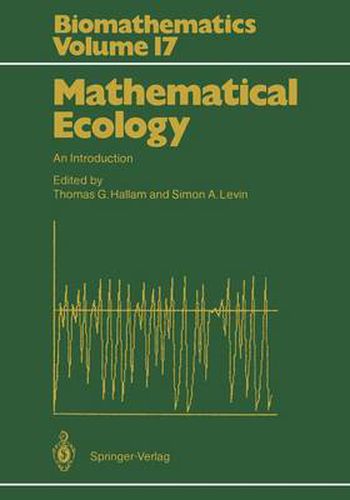Readings Newsletter
Become a Readings Member to make your shopping experience even easier.
Sign in or sign up for free!
You’re not far away from qualifying for FREE standard shipping within Australia
You’ve qualified for FREE standard shipping within Australia
The cart is loading…






This title is printed to order. This book may have been self-published. If so, we cannot guarantee the quality of the content. In the main most books will have gone through the editing process however some may not. We therefore suggest that you be aware of this before ordering this book. If in doubt check either the author or publisher’s details as we are unable to accept any returns unless they are faulty. Please contact us if you have any questions.
There isprobably no more appropriate location to hold a course on mathematical ecology than Italy, the countryofVito Volterra, a founding father ofthe subject. The Trieste 1982Autumn Course on Mathematical Ecology consisted of four weeksofvery concentrated scholasticism and aestheticism. The first weeks were devoted to fundamentals and principles ofmathematicalecology.A nucleusofthe material from the lectures presented during this period constitutes this book. The final week and a half of the Course was apportioned to the Trieste Research Conference on Mathematical Ecology whose proceedings have been published as Volume 54, Lecture Notes in Biomathematics, Springer-Verlag. The objectivesofthe first portionofthe course wereambitious and, probably, unattainable. Basic principles of the areas of physiological, population, com- munitY,and ecosystem ecology that have solid ecological and mathematical foundations were to be presented. Classical terminology was to be introduced, important fundamental topics were to be developed, some past and some current problems of interest were to be presented, and directions for possible research were to be provided. Due to time constraints, the coverage could not be encyclopedic;many areas covered already have merited treatises of book length. Consequently, preliminary foundation material was covered in some detail, but subject overviewsand area syntheseswerepresented when research frontiers were being discussed. These lecture notes reflect this course philosophy.
$9.00 standard shipping within Australia
FREE standard shipping within Australia for orders over $100.00
Express & International shipping calculated at checkout
This title is printed to order. This book may have been self-published. If so, we cannot guarantee the quality of the content. In the main most books will have gone through the editing process however some may not. We therefore suggest that you be aware of this before ordering this book. If in doubt check either the author or publisher’s details as we are unable to accept any returns unless they are faulty. Please contact us if you have any questions.
There isprobably no more appropriate location to hold a course on mathematical ecology than Italy, the countryofVito Volterra, a founding father ofthe subject. The Trieste 1982Autumn Course on Mathematical Ecology consisted of four weeksofvery concentrated scholasticism and aestheticism. The first weeks were devoted to fundamentals and principles ofmathematicalecology.A nucleusofthe material from the lectures presented during this period constitutes this book. The final week and a half of the Course was apportioned to the Trieste Research Conference on Mathematical Ecology whose proceedings have been published as Volume 54, Lecture Notes in Biomathematics, Springer-Verlag. The objectivesofthe first portionofthe course wereambitious and, probably, unattainable. Basic principles of the areas of physiological, population, com- munitY,and ecosystem ecology that have solid ecological and mathematical foundations were to be presented. Classical terminology was to be introduced, important fundamental topics were to be developed, some past and some current problems of interest were to be presented, and directions for possible research were to be provided. Due to time constraints, the coverage could not be encyclopedic;many areas covered already have merited treatises of book length. Consequently, preliminary foundation material was covered in some detail, but subject overviewsand area syntheseswerepresented when research frontiers were being discussed. These lecture notes reflect this course philosophy.